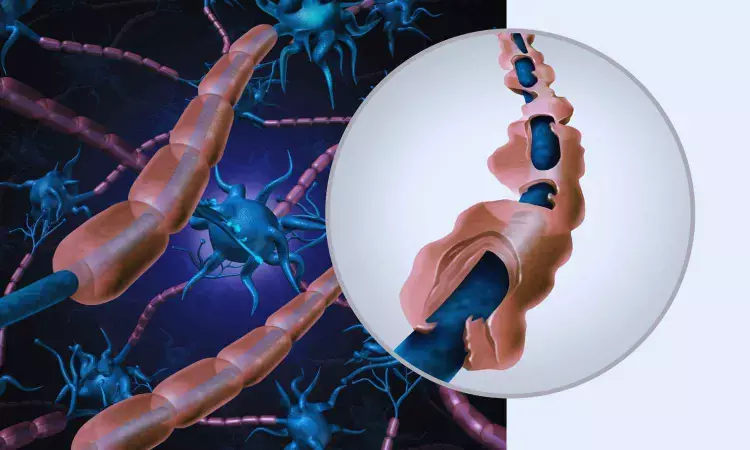- Home
- Medical news & Guidelines
- Anesthesiology
- Cardiology and CTVS
- Critical Care
- Dentistry
- Dermatology
- Diabetes and Endocrinology
- ENT
- Gastroenterology
- Medicine
- Nephrology
- Neurology
- Obstretics-Gynaecology
- Oncology
- Ophthalmology
- Orthopaedics
- Pediatrics-Neonatology
- Psychiatry
- Pulmonology
- Radiology
- Surgery
- Urology
- Laboratory Medicine
- Diet
- Nursing
- Paramedical
- Physiotherapy
- Health news
- Fact Check
- Bone Health Fact Check
- Brain Health Fact Check
- Cancer Related Fact Check
- Child Care Fact Check
- Dental and oral health fact check
- Diabetes and metabolic health fact check
- Diet and Nutrition Fact Check
- Eye and ENT Care Fact Check
- Fitness fact check
- Gut health fact check
- Heart health fact check
- Kidney health fact check
- Medical education fact check
- Men's health fact check
- Respiratory fact check
- Skin and hair care fact check
- Vaccine and Immunization fact check
- Women's health fact check
- AYUSH
- State News
- Andaman and Nicobar Islands
- Andhra Pradesh
- Arunachal Pradesh
- Assam
- Bihar
- Chandigarh
- Chattisgarh
- Dadra and Nagar Haveli
- Daman and Diu
- Delhi
- Goa
- Gujarat
- Haryana
- Himachal Pradesh
- Jammu & Kashmir
- Jharkhand
- Karnataka
- Kerala
- Ladakh
- Lakshadweep
- Madhya Pradesh
- Maharashtra
- Manipur
- Meghalaya
- Mizoram
- Nagaland
- Odisha
- Puducherry
- Punjab
- Rajasthan
- Sikkim
- Tamil Nadu
- Telangana
- Tripura
- Uttar Pradesh
- Uttrakhand
- West Bengal
- Medical Education
- Industry
New blood test shows promise in detecting ALS early

New research by UCLA Health has found a simple blood test could provide faster and more accurate diagnosis of ALS by measuring cell-free DNA. The noninvasive test could not only allow neurologists to rule out other neurological diseases but also detect ALS disease earlier to provide better treatment and potentially improve life expectancy.
The study, published in the journal Genome Medicine, is the first to test cell-free DNA — fragments of DNA released into the blood from dying cells — as a potential ALS biomarker.
Commonly known as Lou Gehrig's disease, amyotrophic lateral sclerosis (ALS) is a rare and currently incurable neurodegenerative disease that causes the loss of motor neurons in the brain and spinal cord.
ALS onset typically begins in patients who are 50-70 years old with life expectancy being only two to five years after initial diagnosis, according to the National Institutes of Health. While ALS is rare in people ages 40 or younger, earlier diagnosis can provide higher life expectancy, thus prompting neurologists to find a way to better predict onset and disease intensity.
“There is an urgent need for a biomarker in ALS to diagnose patients more quickly, support clinical trials and monitor disease progression,” said the study’s lead author Dr. Christa Caggiano, a postdoctoral fellow at UCLA Health’s Neurology Department. “Our study presents cell-free DNA, combined with a machine learning model, as a promising candidate to fill this gap.”
Caggiano and fellow UCLA Health researchers, along with their collaborators at the University of Queensland, tested cell-free DNA as an ALS biomarker because it releases from dying cells in different body tissues affected by the disease and have distinct signatures. These signatures are caused by the natural process of DNA methylation, which occurs when a methyl group molecule attaches to DNA and helps to regulate expression of genes. ALS leads to changes both in the amount of cell-free DNA released from degenerating cells as well as patterns of methylation.
In the study, Caggiano tested this method on two groups of ALS patients and healthy participants. Computer models tested to see if these DNA signals could predict which patients had ALS and who was healthy. The test was able to significantly discriminate between ALS patients and healthy participants and was able to provide insights disease severity.
“Our model test could not only distinguish ALS patients from healthy individuals but also from those with other neurological conditions, which is a challenge for current ALS biomarkers,” Caggiano said. “We hope this could lead to faster diagnoses and better predictions of patient outcomes."
Caggiano said an advantage of this test is that it examines cell-free DNA from several tissue types and not just nerve cells. The test was able to pick up signals from dying muscle tissue and inflammation, suggesting that ALS may also affect muscle tissues and immune cells.
While the biomarker test shows promise, Caggiano said larger studies with more diverse participants and testing methods are needed before it can be relied on in clinical settings. UCLA Health is currently conducting a larger trial in conjunction with other research institutions to attempt to validate this biomarker test.
Reference:
Caggiano, C., Morselli, M., Qian, X. et al. Epigenetic profiles of tissue informative CpGs inform ALS disease status and progression. Genome Med 17, 115 (2025). https://doi.org/10.1186/s13073-025-01542-5.
Dr Kamal Kant Kohli-MBBS, DTCD- a chest specialist with more than 30 years of practice and a flair for writing clinical articles, Dr Kamal Kant Kohli joined Medical Dialogues as a Chief Editor of Medical News. Besides writing articles, as an editor, he proofreads and verifies all the medical content published on Medical Dialogues including those coming from journals, studies,medical conferences,guidelines etc. Email: drkohli@medicaldialogues.in. Contact no. 011-43720751


